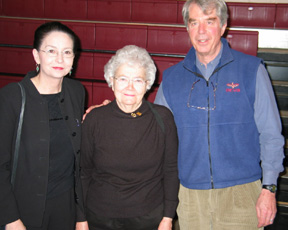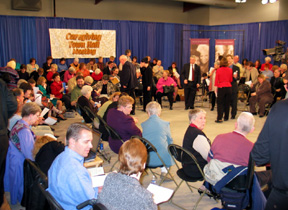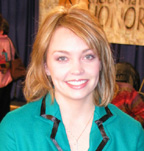 |
From left, Jane Potter, M.D., Rosalee Yeaworth, Ph.D., and Dale Bell. |
Dr. Potter is chief of the UNMC Section of Geriatrics and Gerontology and the Neumann M. & Mildred E. Harris Geriatric Professor. At the videotaping, College of Nursing Emeritus Dean and Professor Rosalee Yeaworth, Ph.D., joined Dr. Potter on the panel of experts.
Excerpts from the Nebraska taping, which was done March 16 in Kearney, are anticipated in the 90-minute PBS special scheduled to air the same night, titled, “And Thou Shalt Honor: A Town Hall Meeting on Caregiving.” The PBS production also will include footage from seven other town hall meetings across the nation. Nebraska’s meeting was the only statewide gathering. The other meetings were in Denver, Kansas City, Mo., Cleveland, Milwaukee, Los Angeles/Orange County, Calif., Seattle and Boston. Each meeting included many elder caregivers conversing with a panel of professionals from the fields of education, government, community social services and medicine.
Elder caregiving is one of the most vitally necessary social duties performed in America today. In 2004, the National Family Caregivers Association, based in Washington, D.C., estimated that 27 million family caregivers in the United States, including spouses, sons, daughters, partners and loving friends, spend, on average, more than 1,000 hours a year providing care to a loved one with little or financial support – an estimated $257 billion a year in uncompensated services.
Caregiving is among the most stressful responsibilities a person can assume, typically taking a toll on the caregiver’s health and financial security. Research shows that 61 percent of family caregivers who provide at least 21 hours of care a week suffer from depression, and many are unable to keep their paid jobs. A 2002 survey of Maryland caregivers revealed that a staggering 92 percent of caregivers take time off of work, reduce their hours or quit their jobs altogether because of family caregiving commitments. According to a study conducted by Met Life, the associated loss to American businesses is as high as $29 billion a year.
The nation’s Baby Boom generation (approximately 78 million people born between 1946 and 1964) is rapidly moving from middle age (40) to older age (59) and in just another decade will begin sending millions more people each year into the ranks of the elderly. It already is estimated that by 2010 there will be more than 400,000 people in Nebraska over the age of 65, and by 2020, people age 65 and older will climb to 22 percent of the state’s rural areas. It also is estimated that by 2020, the nation will be short more than 800,000 nurses. Nebraska will require an additional 5,000.
 |
During the taping, the crew used seven cameras — including a computer operated overhead boom to cover every inch of the room. |
During the three-hour videotaping in Kearney, the studio audience engaged 16 professionals in discussions that ranged from pointed to poignant – even heartbreaking at times. Elder caregiving in small rural communities can be especially hard in terms of access to auxiliary services and programs, Dr. Potter said, noting that 46 percent of Nebraska’s 93 counties are medically underserved.
In Kearney, co-executive producer Dale Bell (who won an Academy as associate producer of the classic documentary “Woodstock” and was assistant director on Martin Scorsese’s debut classic “Mean Streets”) told the audience he couldn’t guarantee how much of the Nebraska town hall meeting footage would appear in the national production. But Dr. Potter had more than half a dozen extended responses on camera, and Dr. Yeaworth had another three or four, so UNMC has a good chance of getting some representation on the national program.
“This town hall meeting was enlightening, moving and needed,” Dr. Potter said. “Medicine has been slow in coming to the awareness of the multiple dimensions involved when caring for the elderly. Nursing has understood for years that health professionals must be more aware of the entire social environment of the patient. I lecture students all the time that what happens in the house is as important as what happens in the clinic.”
Dr. Potter now leads a large group of academic physicians in geriatrics, although when she was hired in 1982, very little on geriatrics education was included in the medical curriculum. That has changed under Dr. Potter’s leadership. The integrating of the curriculum received a boost in 2000 with a grant from the Association of American Medical Colleges and an even bigger boost in 2001, when the Donald W. Reynolds Foundation awarded UNMC a $2 million grant to strengthen physician training in geriatrics in the state.
Dr. Yeaworth, who cared for her husband for a number of years before he died, spoke as a caregiver and as a health professional.
“An important reality is that most elderly who have functional disabilities sufficient to need help with activities of daily living (ADLs) also have chronic illnesses which need management, and they are prone to acute, episodic illnesses such as urinary tract infections or pneumonia,” Dr. Yeaworth said “Thus, they don’t just need housing and help with ADLs, but they also need health care and treatment of these temporary conditions.”
Nebraska assisted living regulations do not require any licensed nursing staff, Dr. Yeaworth said, and they expressly prohibit any complex nursing interventions, “which are merely interventions that require RN judgment. These regulations should be changed so that assisted living residents can be kept healthier and do not have to be moved to nursing homes for short-term, temporary illnesses.”
The meeting unfolded as a series of responses to videotape segments from the original “And Thou Shalt Honor” television special aired throughout the United States in 2002. The audience saw a three- to four-minute clip of caregivers and professionals discussing topics that included elder law, financial planning, asset protection, health care services, geriatric medicine, home-based versus facility-based care options, life styles, family conflict and more. Each topic was addressed by the panel of professionals prior to opening it up to the caregiver audience.
 |
Mary Bosshardt |
“Physicians and nurses in geriatric specialties are primarily paid through Social Security, Medicare and Medicaid,” Bosshardt said. “Yes, we all agree that caring for the elderly brings its own kind of reward, but when people are starting out in their careers, with school loans to pay, homes to buy and a need to get their lives established, we need to consider greater remuneration,” she said. “Unfortunately, this is a money-driven society. The fact is that even the majority of the labor force in geriatrics – home health aides, nursing home aides, etc. – really cannot make a decent living in this field.”
In addition, Dr. Potter noted, the American health system currently is skewed towards acute, big-ticket kinds of disease. “Traditional health care has always been an acute disease model (mainly covered by Medicare), but now everything is chronic care (mainly covered by the much less-funded Medicaid),” Dr. Potter said.
“In Europe the emphasis is on providing what people actually need,” she said. “Today, I can get a patient a $40,000 defibrillator implant procedure with no problem, but to get that same patient a $400 ramp so that they can get in and out of their house in a wheelchair is virtually impossible.
“Too many Americans are placed in nursing homes today because they can’t afford or lack access to adequate social assistance and amenities that would enable them to stay in their homes. There is a great need now to merge Medicare and Medicaid and finally end the artificial barriers between acute and chronic care.”
Bell and his co-executive producer, Harry Wiland, were inspired to create “And Thou Shalt Honor” after extended elder caregiving experiences with their own parents. Bell and Wiland want Americans to seriously think about who is going to be at their own bedsides when the time comes.
“How we treat our elderly and vulnerable citizens defines us as a society, but more importantly, the act of caregiving provides us the opportunity to honor those we love,” Bell said. “We urge everyone across the nation to become engaged in the caregiving cause. Chances are good that every person is either a caregiver, a care-receiver, knows a caregiver or will become one at some point in the future.”
Check your local NET listings for the June 22 broadcast schedules. For more information about the PBS special, visit Web site www.thoushalthonor.org. For more information about elder caregiving in Nebraska, contact the Eastern Nebraska Office on Aging at 558-3696.